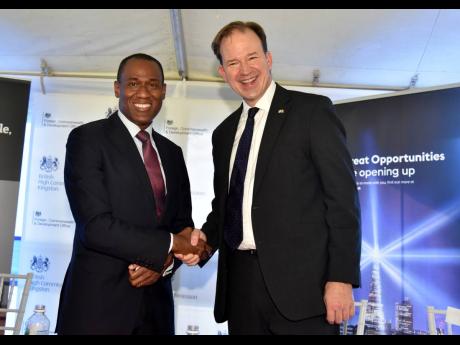Brits eye fair weather with climate-change investment drive
In an effort to combat the climate-change challenges of small island developing states (SIDS) such as Jamaica, Britain has returned to the island with its Commonwealth Development Corporation (CDC) model in an effort to woo investors to tap regional opportunities.
The United Kingdom’s (UK) Development Finance Institution now goes under the name the British International Investment (BII), with more than 74 years of experience of successfully supporting sustainable, long-term growth of businesses in Asia, Africa, and the Caribbean.
The CDC was last active in the Caribbean more than 20 years ago and forms part of the UK’s wider commitment to strengthen economic partnerships and investment globally.
BII is now a key part of the UK’s global plans to mobilise up to £8 billion a year of public- and private-sector investment by 2025.
This will include BII partnering with capital markets, leveraging the firepower of the city of London and other funds to scale up financing for private-sector development.
The BII was launched on Tuesday by Jesse Norman, UK minister for the Americas and overseas territories in the Foreign, Commonwealth and Development Office, at the British High Commission in New Kingston.
Pointing out the challenges of SIDS, Norman said that climate change was recognised as the existential threat of our time, which was a major reason why the British are returning to the Caribbean with the model.
“This problem is compounded for small island developing states, many of which are here in the Caribbean, given their unique vulnerabilities,” Norman said.
The minister for the Americas and overseas states said the effects of climate change, whether sea-level rises or extreme-weather events, often hit SIDS the hardest.
“So, too, the impacts of global economic pressures, and yet when these countries try to respond to, and recover, they are hampered by the international system, in particular with accessing the finance for recovery and resilience,” he said.
Norman stated that another reason why they returned with the BII is because many global inequities and imbalances have worsened, especially with the COVID pandemic having devastating impacts on health, social and economic consequences from which Caribbean countries are yet to recover.
“Now, we face a new, and unprecedented challenge, as Russia’s illegal war damages the global economy, compounds food insecurity, and affected the international rule of law,” Norman said.
He said at COP26, the UK launched its SIDS Capacity and Resilience Programme to help states use both concessional and climate finance to reach their development goals.
To meet the UK’s 2030 ambition, the private sector must be leveraged and direct investment in business-led solutions to these challenges is a crucial piece of the puzzle. That is where BII comes in.
BII will prioritise investments in the private sector, especially with small and medium-size enterprises, with a focus on sustainable and scalable projects. This will provide clean, reliable financing to unleash the huge potential of entrepreneurs.
Norman also said the BII builds on Prime Minister Andrew Holness’ commitments made at COP26 to help developing countries take advantage of clean technology and grow their economies sustainably.
He supported delivering climate financing for projects like solar power, sustainable transport, and disaster-resilient infrastructure over the next five years while enabling partner countries to avoid unsustainable debt.
These investments will be particularly important for the region’s medium- to long-term recovery post-pandemic.
The BII is a programme the Government of Jamaica welcomes.
Dr Nigel Clarke, Jamaica’s minister of finance and the public service, said he celebrates the return of BII to Jamaica.
“Why did you leave in this first place?” Clarke asked as he started his speech before laughing.
“I grew up knowing the Commonwealth Development Corporation … who was an active investor in the Caribbean region, an active investor in Jamaica. What we are hearing is that era of the British, the UK Government, being active in the region with investments in the private and public sector, is an era that is returning. That is good news,” Clarke said.
He said it comes at a time when Jamaica is open and ready for opportunities such as the BII.
Clarke said amid the return of the BII, Jamaica still has work to do with infrastructure and leverage fiscal credibility and economic stability.
He recalled that there were many significant investment by the CDC in Jamaica during their tenure in the past.

